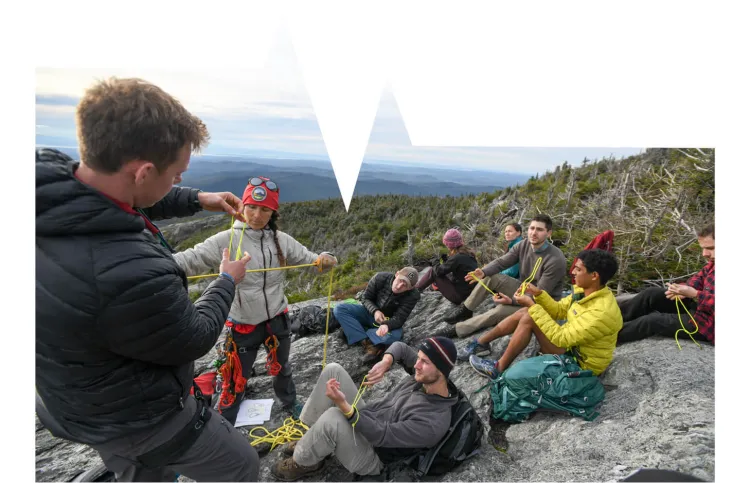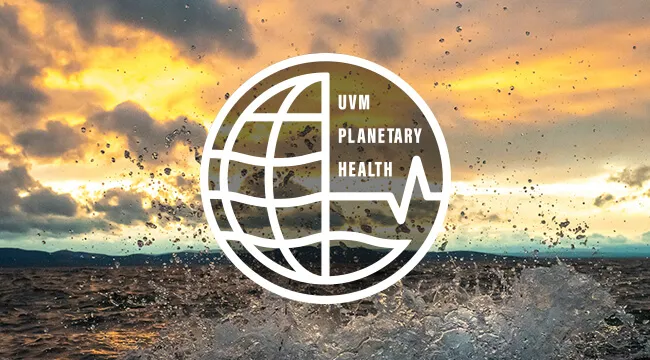Around the globe, we are witnessing the consequences of a planet in distress with climate change, deforestation, pollution, and endangered species. The repercussions and challenges to human health from wildfires, floods, drought, food insecurity, increased allergens, and vector-borne diseases are real and profound, especially for children, older adults, people with chronic illness, and members of low-income populations and communities of color.
Last fall, the University of Vermont launched a Planetary Health Initiative based on the conviction that caring for Earth’s health improves health outcomes for all who live on the planet. It explores these connections, inspires action, and instills hope. Introducing the initiative to the UVM community, UVM Interim President Patricia Prelock, Ph.D., said, “In addition to understanding the science, technology, policy, social science, and behavioral change components of Planetary Health, we are going to need hope to bolster and sustain us in this work.”
At the Larner College of Medicine (LCOM), faculty and students participate in research, clinical care, and education that explore the linkages between human and planetary health and emphasize the implementation of solutions, particularly for vulnerable populations. Following are samples of that work in progress.
Planetary Health & Primary Care
Christine Vatovec, Ph.D., leads the Planetary Health initiative through the Osher Center for Integrative Health (Osher Center). A research assistant professor of biochemistry at LCOM, Vatovec also holds faculty appointments in the College of Nursing and Health Sciences and the Rubenstein School of Environment and Natural Resources (RSENR). Vatovec’s research focuses on identifying opportunities to align health care with planetary health through interventions that improve outcomes for patients, providers, and the natural environment.

A new project led by Vatovec and co-investigators engages primary care clinicians in northern New England to assess their needs for preventing and responding to patients’ climate change–related health risks. These risks may include increased tick- and mosquito-borne diseases like Lyme and West Nile virus, heat-related disorders, respiratory disorders linked to pollutants or pollen, and mental health impacts from floods, droughts, and fear of future disasters.
“Our first step is to assess what residents of Vermont, New Hampshire, and Maine are already experiencing in terms of climate impacts on their health. Next is to learn from primary care providers about what they are seeing in clinic, and what information and resources they need to best respond to their patients’ concerns. We’ll use these two perspectives together to identify best practices to inform clinicians on how to help patients in ways that both improve their health and minimize the impact of health care on carbon emissions,” Vatovec says, noting that health care systems are major contributors to pollution, carbon emissions, and climate change. As examples, hospitals and medical supply chains generate solid waste and air pollution, while pharmaceutical medications infiltrate water systems, with negative consequences for wildlife.
UVM’s Gund Institute for Environment (Gund Institute) and the Northern New England Clinical & Translational Research Network provided $100,000 to launch this project, which will position the research team to develop region-specific tools in support of climate-informed primary care in northern New England.
Planetary Health & Psychiatry
One practical way to start seeding change is by prescribing therapies that deepen a sense of connection to place. Physicians are increasingly prescribing nature-based therapies, which strengthen relationships between individuals and ecological communities while reducing the need for, and impacts from, pharmaceutical interventions. Scientific evidence shows that spending time outdoors in nature increases physical activity levels, reduces stress hormones, and calms the nervous system.
At the VCCYF, clinical director Andrew Rosenfeld, M.D., associate professor of psychiatry and pediatrics, and colleagues developed a “wellness goals worksheet” available for clinicians and families to consider time in nature, pets, and gardening as opportunities for health promotion. The clinicians also participate in a statewide Vermont Parks Prescription program, administered by the state Department of Forests, Parks, and Recreation and the Vermont Governor’s Council on Physical Fitness and Sports, through which clinicians receive “parks prescriptions” to give patients for free day-use entry into a state park.

“This helps us promote well-being, family time, nature connection, and physical activity all at once,” Rosenfeld says, adding that prescribing a day at the park helps the planet, as well as the patient. “Most interventions for anxiety, depression, insomnia, and ADHD include pharmaceuticals as a prominent option. It takes fossil fuels to make and transport medications, and they get into the water supply. A parks prescription creates less pollution and a lower carbon footprint. These nonpharmaceutical interventions are shown to be just as helpful, or more helpful, than pharmaceuticals, without side effects, especially in child and adolescent mental health.”
"Nature-based prescriptions “promote well-being, family time, nature connection, and physical activity all at once.”
– Andrew Rosenfeld, M.D.
Along with reduced pollution and a lower carbon footprint, nature-based therapies also increase nature-connectedness, people’s sense of themselves as a part of nature, which is correlated with nature activism, sustainable choices in commuting, recycling, composting, and taking care of the environment, Rosenfeld says.
Rosenfeld and colleagues including Vatovec and Kayla Corbett, M.D., assistant professor of family medicine, Constance Van Eeghen, Dr.P.H., associate professor of medicine, and environmental science researchers are investigating ways to expand the use of nature prescriptions in other specialties. Their project would identify actions that primary care physicians in family medicine practices can take to encourage and support patients in gaining exposure to nature and demonstrate the benefits of those actions for improving such conditions as anxiety, depression, hypertension, and diabetes. The team intends to seek funding to be able to start doing this research, including a small pilot with an interested primary care practice.

Planetary Health & Pediatrics
Several projects focusing on children and youth health fall under the planetary health umbrella. Frederick Morin, M.D., professor of pediatrics and former dean of the Larner College of Medicine, has been instrumental in connecting researchers at LCOM with collaborators across the university campus.
One project examines recent surges of vector-borne diseases resulting from interrelated factors of land management, human population pressures, and climate change. The research team includes infectious disease expert Benjamin Lee, M.D., associate professor of pediatrics, along with Vatovec and researchers from RSENR, the College of Arts and Sciences, and Gund Institute. The team is focusing on ticks, which are responsible for 95 percent of vector-borne disease cases in the U.S. The project aims to determine the prevalence and drivers of tick-borne pathogens in Vermont’s outdoor recreation areas, how changing climate and recreation patterns affect the risk landscape, and what preventive measures could mitigate negative outcomes for human health.

Another project involves researchers from the Vermont Child Health Improvement Program (VCHIP) collaborating with colleagues from RSENR to study the effects of wildfire smoke on a large cohort of children and adolescents with asthma followed through the University of Vermont Health Network. Fueled by extreme heat and low moisture, wildfires in Canada created poor air quality across Vermont with sustained elevations in respirable small particulates. The investigators hypothesize that wildfire smoke triggers inflammation in the airways of youth with asthma, leading to a loss of disease control evidenced by the severity of respiratory illness presenting at clinical visits. The research team is analyzing multiple years of electronic health record asthma data and local air quality data to understand the impact of wildfire smoke exposure on asthma exacerbations in youth over time. Using an “asthma smart form,” a clinical decision support tool developed by the UVM Children’s Hospital that helps clinicians assess asthma symptoms and deliver care, researchers can assess the impact of poor air quality from the wildfires on asthma symptoms assessed during normal clinical visits. This work will serve as a proof of concept for future collaborations involving clinical data from the health network and environmental data.
–––––
Additionally, VCHIP team members are beginning to investigate climate anxiety among children and adolescents in a collaboration with colleagues from the Vermont Center for Children, Youth, and Families (VCCYF) and RESNR. “Youth across Vermont’s unique rural landscape will have more time to be exposed to climate change–related stressors than adults and may suffer more negative effects to their mental health. It is our hope that this new collaboration will lead to future research, youth-centered interventions, and improvements to clinical care,” says mental health epidemiologist Valerie Harder, Ph.D., M.H.S., professor of pediatrics and psychiatry.
Planetary Health & Medical Education
Medical students are increasingly conscious of planetary health issues, and the medical curriculum is evolving in response. Chellie Nayer, Larner medical Class of 2025, led an effort by medical students to participate in the inaugural Planetary Health Report Card for the UVM Larner College of Medicine. The Planetary Health Report Card is an international student-led initiative engaging teams of students and faculty to use a metric-based tool for evaluating and improving planetary health content in health professional schools. During the past year, Nayer and peers searched public records, met with topic specialists, and scoured the medical curriculum to accurately reflect the school’s engagement with planetary health topics in the curriculum, research agenda, community outreach, and campus sustainability.
The 2024 LCOM report card earned an overall grade of C+, with the lowest marks for planetary health curriculum, community outreach, and student-led initiatives. Nayer and peers are participating in the 2025 Planetary Health Report Card with a goal to continually re-evaluate and advocate for improvements.
“We wanted to participate not just to assign a score to our medical school, but really to identify areas that need work,” Nayer says. While we did get a C+, we rank similarly to, if not better than, many other medical schools. By filling out the report card, we identified ways in which we can enhance our planetary health curricula. We are hoping to partner with course directors to explicitly teach planetary health topics. We are also hoping to design dedicated planetary health curriculum for a course on social medicine topics.”

At an interprofessional session last February, 124 first-year medical students and 86 students in other health care disciplines explored planetary health in clinical care. The students worked together to investigate the bidirectional connection between health care and planetary health and brainstorm actions that health care providers can take to decrease the negative effects of health care on the planet’s health. For example, they discussed how supporting healthy behavior changes—such as eating a plant-based diet, and cycling or walking instead of driving—reduce pollution and greenhouse gases. Karen Lounsbury, Ph.D., assistant dean for the preclinical curriculum, developed the session with partners in the College of Nursing and Health Sciences, and Vatovec facilitated the event.
–––––
Medical educators also explored planetary health topics at a Teaching Academy educational retreat last winter. A keynote speaker from the Planetary Health Alliance at Harvard T.H. Chan School of Public Health illuminated the ways in which a medical education curriculum can be enriched with planetary health concepts, frameworks, and values. A breakout session titled “How to do planetary health in my specialty” had faculty examining how to incorporate planetary health into their clinical practice.
“We are also hoping to design dedicated planetary health curriculum for a course on social medicine topics.”
– Chellie Nayer ’25

Planetary Health & Public Health Education
“UVM’s Planetary Health Initiative has great synergy with public health and global health at LCOM and our focus on the health of individual patients and entire populations,” says Jan K. Carney, M.D., M.P.H., professor of medicine and associate dean for public health and health policy. The graduate public health program offers a master of public health degree with concentration in global health leadership, certificates of graduate study in global and environmental health, and micro-certificates in climate change and human health, environmental health, global health, and health equity. A variety of public health courses relate to environmental sustainability and planetary health.

Students taking PH 6310 Climate Change Emergencies examine the public health challenges of floods, droughts, severe heat waves, wildfires, and disruptions to food supplies. Discussions focus on the potential of these emergencies to cause complex humanitarian crises, civil unrest, military conflict, and large-scale migration, along with policy implications going forward. Langdon Lawrence, M.D., M.P.H., education assistant professor of medicine in the Division of Public Health, teaches this course.
Sophia Piffard, a 2021 neuroscience alum who will graduate this spring with an M.P.H., says this course has guided her toward a career combining community health and planetary health. “I feel empowered by understanding the mechanisms of climate change and equipped with the skills to become a leader in this field,” Piffard says. “I walked away with a deeper understanding of the cascading, overlapping effects of climate change on the earth and its inhabitants. Dr. Lawrence does not shy away from the hard, often heartbreaking subjects, and is still able to cultivate a sense of hope.”
A new course offered this spring, PH 5990 Planetary Health, explores the interconnected relationship between human health and the environment. Through systems thinking, case studies, and interdisciplinary discussions, students examine human-created drivers of global environmental changes and assess their expansive impacts on natural resources and human health. For example, students consider a “Dams and Disease” scenario in Senegal where residents built a dam to supply fresh water and generate power. Construction of the dam led to destruction of habitat for prawns that eat snails carrying schistosomiasis, or “snail fever,” a disease caused by a parasitic worm that lives in snails. The students learned about this and then had to decide how to reintroduce prawns into the reservoir to eat the snails. Most students chose to erect a mesh ladder for the prawns to bypass the dam.
Envisioning and articulating success inspires students to create and implement transformative solutions to human health and environmental challenges, says Thomas Griffin, Ph.D., professor of medicine in the Division of Public Health, who teaches the course. “Students see real-world examples of planetary health challenges and how interdisciplinary approaches are needed to develop solutions,” Griffin says. “There’s so much doom and gloom in climate narratives. I want the students to walk away from the course with hope and solutions.”
Cultivating optimism and collaborative problem-solving are key goals of planetary health research and education at LCOM and across the UVM campus, Vatovec says: “With the brightest minds working on these challenges with committed local and global partners, UVM will chart a course toward a healthier future for both people and planet.” VM
Learn about UVM’s Planetary Health Initiative, which explores connections between nature and human health so that people and planet can thrive.
